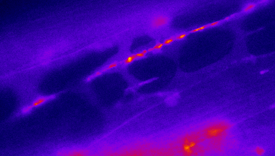
Adam Kepecs, Ph.D.
Professor of Neuroscience and Psychiatry, Washington University in St. Louis
SFARI Investigator WebsiteAdam Kepecs is interested in understanding how brain circuits carry out cognitive tasks, often beyond the capacity of current machine-learning algorithms, and the changes in these brain circuits that result in neurodevelopmental and psychiatric disorders.
Kepecs’ lab pioneered a computational behavioral approach to isolate distinct cognitive processes and translate these across species. Combining this with electrophysiological, imaging, optogenetic and molecular techniques, Kepecs has established the neurobiological basis of decision confidence and identified several cell-type-specific cortical principles. His lab established a rigorous framework to link human confidence reports to statistical decision confidence and identified the first neural correlates of confidence in animals. Their recent studies uncovered the cell-type-specific organization underlying this confidence computation in the rat orbitofrontal cortex. Kepecs’ current focus is to build a bridge from mechanistic brain studies in animal models to clinical psychiatry. This cross-species computational psychiatry approach was used to model hallucinations in mice and people, and revealed elevated dopamine in sensory striatum as the mediator of hallucination-like perception in mice.
Kepecs received his B.S. in computer science and mathematics in Budapest, Hungary, in 1997. He then switched to studying the brain, completing his Ph.D. at Brandeis University in theoretical neuroscience in 2002 and worked as a postdoctoral fellow at Cold Spring Harbor Laboratory with Zachary Mainen. He joined Cold Spring Harbor Laboratory as a faculty member in 2007, where he rose to program chair of neuroscience. Currently, he is the Robert J. Terry Professor of Neuroscience and a professor of psychiatry at Washington University School of Medicine in St. Louis and a BJC Investigator.
